February 2024: Classic Texts of Confucianism and Daoism
Please join us in February 2024 for a Virtual Reading Group with Peter Mentzel.

We appreciate your interest in this virtual reading group. Unfortunately, this VRG is full and we are no longer accepting registrations. We invite you to check out our upcoming events here. We hope to see you at a future VRG!
Confucianism and Daoism are two ancient belief systems originating in China. They have exercised a profound effect on the development of Chinese civilization for over two thousand years.
The philosophy of Confucianism grew out of the life and teachings of the sage K’ung Fu Tzu (551-479 BCE), while Daoism is based on the semi-mythical figure of Lao Tzu (c.600 BCE) and his followers. While many commentators have regarded these two philosophies as competitors, or even hostile to each other, others have seen them as complementary.
This reading group will explore some of the foundational texts for each of these belief systems, emphasizing the similarities and differences in their understandings of the “good society.” In the process, we can also explore how these texts treat matters of individual freedom, and how people can lead good and happy lives.
Tuesday, February 6, 2024 12:00-1:00 pm EST, “Confucius, The Analects”
Readings:
The Ethics of Confucius - Chapter 1
The Analects of Confucius - Volume II, Book IV; Volume IV, Book VIII; Volume VI, Book XII; and Volume VIII, Book XV
Tuesday, February 13, 2024 12:00-1:00 pm EST, “Mencius”
Readings:
The Chinese Classics: Vol. 2 The Life and Teachings of Mencius - Book I, Parts I and II, and Book II, Part I (pp. 123-195)
Tuesday, February 20, 2024 12:00-1:00 pm EST, “Lao Tzu, The Daodejing”
Readings:
The Texts of Taoism, Part I and Part II (pp. 47-124)
Tuesday, February 27, 2024 12:00-1:00 pm EST, “Chuang Tzu”
Readings:
The Texts of Taoism, Book I, Part I, Sections I-IV (pp. 164-222)